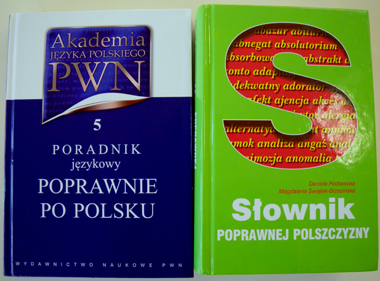With Polish being Polish, it’s no wonder there are gazillions of language reference books and dictionaries out there on the market. Because, yes, even Poles need help with their own native language from time to time. No, actually make that – most of the time. Even I myself cannot imagine functioning without my old trusty słownik ortograficzny.
There are literally shelves upon shelves of Polish help books to choose from. And they range from ridiculously expensive to “front of the shop sale bin” cheap. And that’s not including all the stuff that is available on line.
Myself, I prefer printed books. I like to see the words arranged alphabetically on a page and see the flow from one entry to the next. This way, when you read them, you can marvel at the magnificent confusion of “klauzula” (clause, in a contract, for example) and “klauzura” (area of cloister off-limits to non-monks/non-nuns). Without my trusty dictionary, I would have never even known that such a place existed. But then again, klasztory (cloisters) are not my thing to begin with.
I was looking at my work bag today, and realized that last year there were two books stuck in there more or less permanently. And since it looks like I’ve been using them quite a lot, I thought it might be worth sharing with you what they are.
I got both of them from a sidewalk sales bin and that means they were cheap. And because these books were intended for a wide audience, they are also very functional and simple.
“Słownik poprawnej polszczyzny” by Daniela Podlawska and Magdalena Świątek-Brzezińska (published by Wydawnictwo Szkolne PWN 2008) is meant primarily for students. However, as the authors point out – it can also be used when teaching (and studying) Polish as a foreign language.
Each entry is marked with the appropriate part of speech, gender (where applicable) and the most troublesome cases are also listed. In addition, most entries give an example of the word used in a sentence. Some words (but not all) come with an explanation of their meaning.
Like I said, it’s simple, it’s concise and it’s functional. And it was cheap, too. I paid for it 10 zł.

The other book that stays in my bag is the 5th volume in the Akademia Języka Polskiego PWN series – “Poradnik językowy – Poprawnie po polsku” (Wydawnictwo Naukowe PWN 2007). It’s a collection of about 1000 entries selected from the on-line version of Poradnia Językowa PWN. People asked questions, experts answered, the whole thing got put in a book.
I like it. It makes for some very interesting reading. This book may not be suitable for beginning Polish learners, but for people who are already somewhat proficient in the language it may be an eye-opening experience. It sure was for me!
And the best part? It was also a sales bin find – 14 zł.






Comments:
Pete:
As a student of Polish language, I find Oscar Swan’s ‘Grammar of Contemporary Polish’ indispensable. It is clear, concise and his examples are top notch. He breaks everything down in to logical chapters (unlike the only other English language Polish grammar book that I’m aware of, ‘Polish: an essential grammar’ by Dana Bielec, which I found most illogical). On top of that, Swan has published a .pdf file of this grammar online for free (it cost me £30 online three years ago!), along with an abridged version more suited to beginners (‘Polish grammar in a nutshell’) on his departmental website – http://polish.slavic.pitt.edu/
I have found this to be an essential resource in my university course – highly recommended!
kuba:
I found those reference books on line in Poland but the shipping is expensive. Do you know of any bookstore in the US that sells them?
Pszetfurnia:
Bukowina = las bukowy = beech forest
Source: Słownik języka polskiego (Państwowe Wydawnictwo Wiedza Powszechna, Państwowe Wydawnictwo Naukowe 1958-69; reprint, PWN 1996-97)
Anna Ikeda:
Psze, yes, I know that too. But then shouldn’t it be “pognała wołki DO bukowiny” instead of “na bukowinę”? And how on earth was she supposed to “pasała” those wołki in the forest? 😉
Pete, I have discussed Prof. Swan’s book here in detail already. These here are Polish-Polish reference books.
Kuba,
I don’t know… I will try to look into this. Your best bet might be to ask someone in Poland to buy it for you and send it to you. Will be cheaper than ordering it online, I’m sure.
Alfonso Czaplinski:
Hi Anna good morming!
Thanks for posting via in polish blog. I’m studying the language polish. I am reminding me of many words that I spoke with my parents and grandparents in house, when I was child. God bles you! Ya lubie nascz zieme i nascz ludie!
Hugs
Alfonso Czaplinski from Brazil